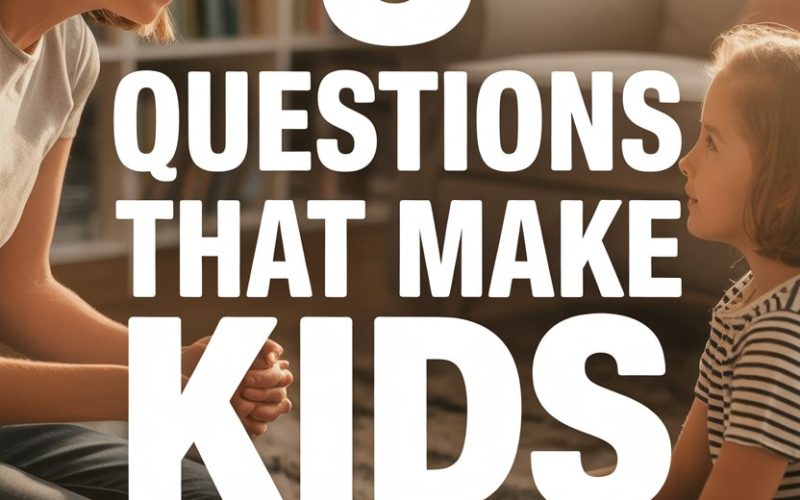Ever tried to get your child talking, only to be met with a shrug, a grunt, or—if you’re really lucky—a full “fine”? If your house echoes with radio silence each time you ask, “How was your day?”, you’re far from alone.
Kids have mastered the art of the conversational dead-end.
Still, with the right questions, you can turn those brick walls into open doors—even if you’ve only got ten minutes before bedtime and their teeth are still suspiciously unbrushed.
Here are three surprisingly simple questions, backed by child development experts and a smidge of old-fashioned parenting wisdom, that can make your little (or not-so-little) one spill the beans.
1. What was something that surprised you today?
Ask a kid, “How was your day?” and you’ll generally receive one of three answers: “good”, “fine”, or “meh.” There’s a reason for this.
Open-ended, yet vague, questions put pressure on children to sum up hours of experiences—schoolwork, playground politics, the epic saga of whose lunchbox went missing—all in one go.
It’s a lot. Even adults would rather opt out.
But ask them what surprised them today, and suddenly, their mind starts combing through the details.
Research from the Yale Center for Emotional Intelligence suggests that focusing on specific emotional triggers (like surprise) helps children access and articulate memories that might have gotten lost in the shuffle.
And you never quite know what you’ll get. Sometimes it’s “We found a toad in the gym,” or “Mrs. Barker wore her hair down,” or even, “I liked the maths test!” (That last one might make you check for a fever.)
The beauty of this question? It makes room for the big and the small, the silly and the serious. Plus, “surprise” is a neutral word—kids don’t have to admit to feeling sad, mad, or anxious. They just get to tell a story.
If your child gives a one-word answer, try following up with, “What happened next?” or “How did that make you feel?”
These gentle nudges can keep the conversation flowing without turning it into an interrogation.
2. Who did you notice being kind today?
Kids are often told to be kind, but rarely asked to observe kindness in others. This question works on several levels.
For one, it gets children thinking about their peers in a positive light—a nifty way of steering them away from the playground drama and toward empathy.
Child psychologist Dr. Laura Markham, founder of Aha! Parenting, highlights that naming acts of kindness helps nurture social awareness and gratitude.
Noticing who helped, shared, or stood up for someone else can also give your child new ideas for their own behaviour (without you having to nag).
And yes, sometimes the answer will be “No one.” If that’s the case, flip it gently: “Did you see anyone who could have used a bit of kindness today?”
This keeps the door open without forcing a silver lining where none exists.
Pro tip: Don’t limit this question to school days. Try it after family gatherings, sports practices, or even a sibling squabble. You might be surprised who gets mentioned—and who’s conspicuously absent.
3. What’s something you’d like to do differently tomorrow?
If you want your child to reflect, grow, and occasionally admit that pinching their brother maybe wasn’t their finest moment, this question is your secret weapon.
Self-reflection doesn’t come naturally to most children (or, if we’re honest, to plenty of adults).
But experts like Dr. Michele Borba suggest that giving kids the chance to think about their choices—without judgement—builds resilience and self-awareness.
This isn’t about shaming or turning every evening into a confessional. It’s a gentle invitation, a way to say, “You get a fresh start tomorrow. Is there anything you’d like to tweak?” The goal isn’t perfection; it’s progress.
Some nights, your child will stare at you blankly and ask if they can have pudding now. Other times, you’ll get a gem: “I want to try not yelling when Mum says it’s bedtime,” or “I think I’ll play with someone new at lunch.”
Celebrate the small wins, even if progress is slower than the ice cream truck on a rainy day.
Making Conversation a Ritual, Not a Chore
Timing is everything. Most kids don’t want to talk the moment they walk in the door, arms full of bookbags and snack wrappers.
The best conversations often sneak up on you—during a car ride, as you chop veggies together, or while you’re both folding laundry and arguing about whether that sock is blue or grey.
Try peppering these questions into your regular routines.
Bedtime, with its soft lighting and lack of distractions, is a classic. But don’t be afraid to get creative—some parents swear by the “captive audience” technique (otherwise known as the school run).
And remember: silence isn’t always a sign you’ve failed. Sometimes, kids need time to mull over a question.
A thoughtful “Hmmm…” might sprout into a full story the next day.
What to Do When the Answer is…Nothing
Every parent has been there. You ask an inspired, research-backed question, and your child replies, “I dunno” or “Nothing happened.” Resist the urge to fill the silence or try again immediately.
Instead, model your own answer: “You know, I was surprised today when the bin men actually waved back at me.” Or, “I saw someone being kind when a lady let another person skip the queue at the shops.”
By sharing your stories, you’re showing your child how to reflect, notice others, and admit you don’t always get it right either.
And on the off chance your child’s ready to talk just as you’re about to fall asleep, take a deep breath and listen. Even if you’d rather be horizontal.
The Power of Listening (Without Jumping In)
Eager as we may be for those heart-to-hearts, real connection comes from listening without fixing, judging, or offering a motivational speech.
When your child opens up—whether it’s about playground gossip, a tricky maths problem, or a worry about the world—just listen. Nod, ask a gentle follow-up, maybe crack a smile if the story involves glitter or goats.
Research from Harvard’s Making Caring Common project suggests that when adults truly listen, children feel valued, safe, and more likely to keep sharing. And isn’t that what we’re all after?
Building the Habit—For Parents and Kids
Rome wasn’t built in a day, and neither is a chatty child. It can take weeks (sometimes months) for kids to get used to answering questions that go beyond “Did you brush your teeth?” or “Where are your shoes?” But keep at it.
Your consistency is the secret sauce.
If all else fails, try writing the questions on slips of paper and popping them in a jar. Each night, take turns picking one to answer—parents included.
This game-like approach removes some of the performance pressure and can even spark a few giggles.
For parents pressed for time, quality wins over quantity. Even one thoughtful question is better than a barrage of rapid-fire inquiries.
The goal isn’t to wring a full autobiography out of your child every night, but to open the door, even just a crack.
Some Days, the Magic Works
Next time you long to hear more than “fine,” try one of these questions. You’ll be amazed at what tumbles out.
Maybe it’ll be a story about a runaway football, or a classmate’s unexpected kindness, or their plan to finally speak up in assembly.
And when the conversation blossoms—however briefly—take a mental snapshot. These moments may be fleeting, but they matter more than we sometimes realise.
Kids do want to share. Sometimes they just need a different question (and a parent willing to listen, even if dinner is burning in the background).




